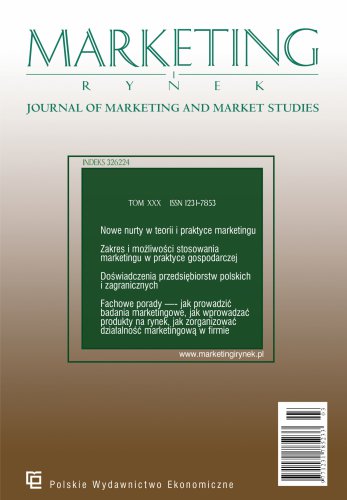Loyalty of travel agencies customers during the COVID-19 pandemic
The main aim of the article is to identify the directions of changes in the purchase decision-making process by purchasers of package holidays offers under the influence of the COVID-19 pandemic, with particular emphasis on their loyalty. The authors requested answers to the following research questions: 1. What changes have occurred in the process of making decisions regarding the purchase of package holidays during the COVID-19 pandemic? 2. Are package travel buyers loyal to travel agencies during the COVID-19 pandemic? For the purpose of achieving the research objective and obtaining answers to research questions, a literature search was conducted, as well as field research. In the case of secondary sources, the method of content analysis was used to study them, while data from primary sources (N = 1508), collected using the indirect survey technique (CAWI), was analysed using descriptive statistics methods, selected loyalty measurement methods, i.e. the Net Promoter Score and the TRI*M index, as well as methods of multidimensional statistical analysis (cluster analysis). The conducted research confirmed that in the face of the threat of the COVID-19 pandemic, the behaviour of travel agency customers changed significantly, particularly in terms of reducing the frequency of trips and limiting them to domestic trips. In addition, although during the pandemic buyers of tourist events showed loyalty to travel agencies, the results indicate that there is still a possibility to strengthen the position of the both in the area of loyalty and satisfaction of buyers of their offers. Customers on the travel agency market in Poland can be characterized as loyal, but moderately satisfied.
References
Bibliografia/References
Akhoondnejad, A. (2016). Tourist loyalty to a local cultural event: The case of Turkmen handicrafts festival. Tourism Management, 52(1), 468–477. https://doi.org/10.1016/j.tourman.2015.06.027
Baquero, A. (2022). Net Promoter Score (NPS) and customer satisfaction: Relationship and efficient management. Sustainability, 14(4), 2011. https://doi.org/10.3390/su14042011
Campón, A. M., Alves, H., & Hernández, J. M. (2013). Loyalty measurement in tourism: A theoretical reflection. W: A. Matias i in. (Red.), Quantitative Methods in Tourism Economics (13–40). Springer-Verlag. https://doi.org/10.1007/978-3-7908-2879-5_2
Chi, C. G. Q., & Qu, H. (2008). Examining the structural relationships of destination image, tourist satisfaction and destination loyalty: An integrated approach. Tourism Management, 29(4), 624–636. https://doi.org/10.1016/j.tourman.2007.06.007
Copeland, M. (1923). Relation of consumers: Buying habits to marketing methods. Harvard Business Review, 1, 282–289.
Jones, T. O., & Sasser, Jr. W. E. (1995). Why satisfied customer defect. Harvard Business Review, 73(6).
Lawu, M. S., Santoso, I., Asbudiutomo, R. M., & Gunadi, W. (2022). Service recovery in online travel agencies during COVID-19 pandemic. W: Proceedings of the International Conference on Industrial Engineering and Operations Management Istanbul, Turkey, March 7–10, 2022 (4386–4397). IEOM Society International.
Madani, A., Boutebal, S. E., Benhamida, H., & Bryant, C. R. (2020). The impact of COVID-19 outbreak on the tourism needs of the Algerian population. Sustainability, 12(21), 8856. https://doi.org/10.3390/su12218856
Michalska-Dudek, I. (2017). Kształtowanie lojalności klientów biur podróży. Wydawnictwo Uniwersytetu Ekonomicznego we Wrocławiu.
Oliver, R. L. (1999). Whence consumer loyalty? Journal of Marketing, 63(4), 33–44. https://doi.org/10.2307/1252099
Otto, J. (2004). Marketing relacji. Koncepcja i stosowanie (wyd. 2 rozszerz.). C.H.Beck.
Prayag, G. (2009). Tourists„ evaluation of destination image, satisfaction and future behavioral intentions – the case of Mauritius. Journal of Travel & Tourism Marketing, 26(8), 836–853. https://doi.org/10.1080/10548400903358729
Rather, R. (2021). Demystifying the effects of perceived risk and fear on customer engagement, co-creation and revisit intention during COVID-19: A protection motivation theory approach. Journal of Destination Marketing Management, 20, 100564. https://doi.org/10.1016/j.jdmm.2021.100564
Reichheld, F. F. (2003). The one number you need to grow. Harvard Business Review, 81(12), 46–54.
Reichheld, F. F. (Red.). (2006). The Ultimate Question Driving Good Profits and True Growth. Bain & Company, Harvard Business School Press.
Smyczek, S. (2001). Lojalność konsumentów na rynku. Wybrane zagadnienia. Wydawnictwo Akademii Ekonomicznej w Katowicach.
Statista (2021). Online travel market worldwide. https://www.statista.com/study/15218/online-travel-market-statista-dossier/ (dostęp: 10.12.2022).
UNWTO (2021). Impact assessment of the COVID-19 outbreak on international tourism 2020. https://www.unwto.org/impact-assessment-of-the-covid-19-outbreak-on-international-tourism (dostęp: 10.12.2022).
UNWTO (2022). Global and regional tourism performance. https://www.unwto.org/tourism-data/global-and-regional-tourism-performance (dostęp: 26.01.2023).
Walesiak, M., & Gatnar, E. (Red.). (2009). Statystyczna analiza danych z wykorzystaniem programu R. Wydawnictwo Naukowe PWN.
Wu, H., Cheng, C., & Ai, C. (2018). A study of experiential quality, experiential value, trust, corporate reputation, experiential satisfaction and behavioral intentions for cruise tourists: The case of Hong Kong. Tourism Management, 66(1), 200–220. https://doi.org/10.1016/j.tourman.2017.12.011
Wu, W., & Riantama, D. (2022). Determining the factors affecting customer satisfaction using an extraction-based feature selection approach. Peer Journal of Computer Science, 8, e850. http://doi.org/10.7717/peerj-cs.850
Yang, J., Luo, J.M., & Yao, R. (2022). How fear of COVID-19 affects the behavioral intention of festival participants – a case of the HANFU Festival. International Journal of Environmental Research and Public Health, 19(4), 2133. https://doi.org/10.3390/ijerph19042133
Zhu, Z., Kim, S., & Shin, H. H. (2022). Does the website credibility of online travel agencies (OTAs) affect customers’ evaluation and future intentions? Asia Pacific Journal of Tourism Research, 27(8), 842–855. https://doi.org/10.1080/10941665.2022.2131444

